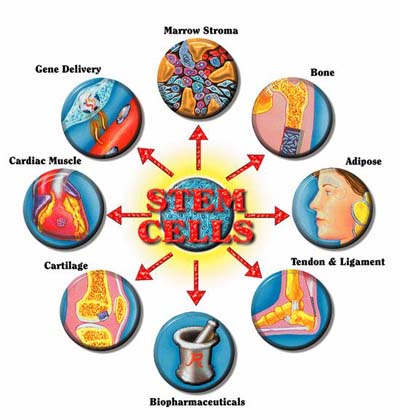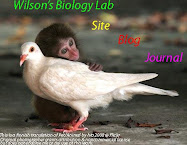 In the study, the scientists took ear and bone marrow cells and "reprogrammed" them by using a virus to introduce a host of chemicals into the cells. The adult cells were successfully transformed into stem cells.
In the study, the scientists took ear and bone marrow cells and "reprogrammed" them by using a virus to introduce a host of chemicals into the cells. The adult cells were successfully transformed into stem cells.Maybe one day, we will be able to harvest human organs grown in pigs. If someone is born with a birth defect or someone develops a disease or someone gets into an accident, their organs can be replaced with these pig-grown human organs. This may be a little unsettling because we may start to view pigs as just organ donors, but I think this is much better than killing human embryos.
Pig Stem Cells
View more presentations from Student Wilsonsbiologylab.
Acknowledgments
Article: http://news.bbc.co.uk/2/hi/health/8078996.stm
Background: http://stemcells.nih.gov/info/basics
Image: http://www.zmescience.com/human-skin-cells-ordered-to-be-embryonic-stem-cells





Interesting piece! I think you understand the significance of the study. I also thought the format of the article was effective: nice picture and hyperlinks throughout the text. I thought you could have included a lot more background information; your explanation of stem cells was minimal and you did not even discuss AIDS and paralysis. More importantly, you vaguely described the study. You will have to conduct background research and give more information about how the scientists transformed the adult cells into stem cells. I read the original article and it did not explain the procedure so you will have to read other sources.
ReplyDeleteNice article. I read a few other articles about this breakthrough. I think you should check out an article written at Michael White's blog at scientificblogging.com called "Time to Ditch Embryonic Stem Cells" which takes the opposite position than you seem to take. It's a good read and gives many responses in favor of embryonic stems.
ReplyDeleteOne more thing, I don't believe that the image you used is licensed. Unless you received permission, then you are potentially in violation of copyright laws.
ReplyDeletethis article makes it harder for me to weigh the pros and cons of stem cell research.
ReplyDelete